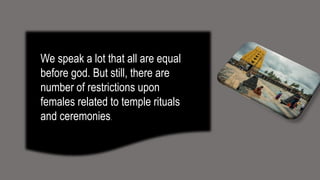Gender roles influence of culture
- 1. Gender Roles – Influence of Culture Mumthaz PP
- 2. Culture influences how men and women think about themselves within their gender role.
- 3. There is vast difference in the dressing style based on gender. Dressing style 1
- 4. 2. Marriage Huge variation can be observed in marriage system based on gender. This starts right from the day of marriage ceremony.
- 5. Women are asked to walk behind the man in the ceremony. Women are expected to live at the husband’s home after marriage. Dowry to be given from the female’s family. Thalaque system followed by the Muslim believer’s. Women are considered as slaves in most of the part of our nation at their husband’s home.
- 7. We speak a lot that all are equal before god. But still, there are number of restrictions upon females related to temple rituals and ceremonies.
- 8. There is restriction for women to enter into few temples even in Kerala. Women are not allowed to any of the temples during their menstrual period. There is restriction to enter into temples if a relative of mother gives birth to child, whereas if it’s a relative of the father, there is no restriction.
- 10. Women should not talk loud at home.
- 11. Female should not put leg on the other leg while sitting, whereas men can.
- 12. Thank you Mumthaz PP Keyi Sahib Training College











